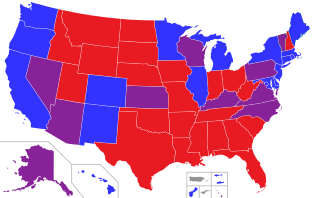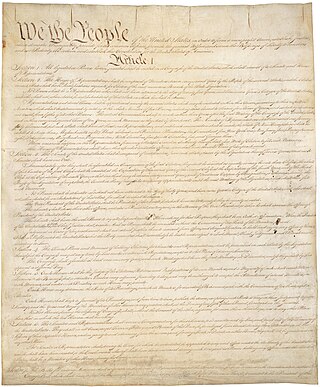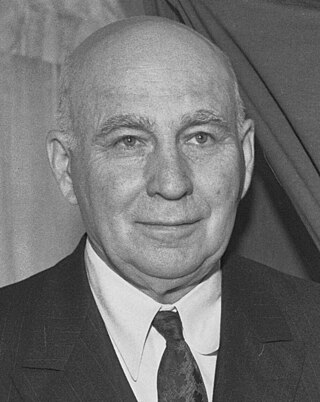Related Research Articles

Article One of the United States Constitution establishes the legislative branch of the federal government, the United States Congress. Under Article One, Congress is a bicameral legislature consisting of the House of Representatives and the Senate. Article One grants Congress various enumerated powers and the ability to pass laws "necessary and proper" to carry out those powers. Article One also establishes the procedures for passing a bill and places various limits on the powers of Congress and the states from abusing their powers.

A state legislature in the United States is the legislative body of any of the 50 U.S. states. The formal name varies from state to state. In 27 states, the legislature is simply called the Legislature or the State Legislature, while in 19 states the legislature is called the General Assembly. In Massachusetts and New Hampshire, the legislature is called the General Court, while North Dakota and Oregon designate the legislature the Legislative Assembly.

The Twenty-fourth Amendment of the United States Constitution prohibits both Congress and the states from conditioning the right to vote in federal elections on payment of a poll tax or other types of tax. The amendment was proposed by Congress to the states on August 27, 1962, and was ratified by the states on January 23, 1964.
A constitutional amendment is a modification of the constitution of a polity, organization or other type of entity. Amendments are often interwoven into the relevant sections of an existing constitution, directly altering the text. Conversely, they can be appended to the constitution as supplemental additions, thus changing the frame of government without altering the existing text of the document.

The Blaine Act, formally titled Joint Resolution Proposing the Twenty-First Amendment to the United States Constitution, is a joint resolution adopted by the United States Congress on February 20, 1933, initiating repeal of the 18th Amendment to the United States Constitution, which established Prohibition in the United States. Repeal was finalized when the 21st Amendment to the Constitution was ratified by the required minimum number of states on December 5, 1933.

Michael Avery Ross is an American businessman and politician. A member of the Democratic Party, he served as the U.S. representative for Arkansas's 4th congressional district from 2001 to 2013 and was his party's nominee for governor of Arkansas in 2014. He is currently the last Democrat to have represented Arkansas in the House of Representatives. He was also a member of the Arkansas Senate from 1991 to 2001, a member of the Nevada County Quorum Court from 1983 to 1985, and a small business owner.


The United States Constitution has served as the supreme law of the United States since taking effect in 1789. The document was written at the 1787 Philadelphia Convention and was ratified through a series of state conventions held in 1787 and 1788. Since 1789, the Constitution has been amended twenty-seven times; particularly important amendments include the ten amendments of the United States Bill of Rights and the three Reconstruction Amendments.

The Congress of the Republic of Colombia is the name given to Colombia's bicameral national legislature.
A supermajority is a requirement for a proposal to gain a specified level of support which is greater than the threshold of more than one-half used for a simple majority. Supermajority rules in a democracy can help to prevent a majority from eroding fundamental rights of a minority, but they can also hamper efforts to respond to problems and encourage corrupt compromises at times when action is taken. Changes to constitutions, especially those with entrenched clauses, commonly require supermajority support in a legislature. Parliamentary procedure requires that any action of a deliberative assembly that may alter the rights of a minority have a supermajority requirement, such as a two-thirds vote.

Frank Finley Merriam was an American Republican politician who served as the 28th governor of California from June 2, 1934 until January 2, 1939. Assuming the governorship at the height of the Great Depression following the death of Governor James Rolph, Merriam defeated the Democratic candidate Upton Sinclair in the California gubernatorial election in 1934. Merriam also served as the State Auditor of Iowa from 1900 to 1903, and served in both the Iowa and California state legislatures.

The Tennessee General Assembly (TNGA) is the state legislature of the U.S. state of Tennessee. It is a part-time bicameral legislature consisting of a Senate and a House of Representatives. The Speaker of the Senate carries the additional title and office of Lieutenant Governor of Tennessee. In addition to passing a budget for state government plus other legislation, the General Assembly appoints three state officers specified by the state constitution. It is also the initiating body in any process to amend the state's constitution.

The Constitution of the State of Texas is the document that establishes the structure and function of the government of the U.S. state of Texas, and enumerates the basic rights of the citizens of Texas.

Voting rights of citizens in the District of Columbia differ from the rights of citizens in the 50 U.S. states. The United States Constitution grants each state voting representation in both houses of the United States Congress. It defines the federal district as being outside of any state, and does not grant it any voting representation in Congress. The Constitution grants Congress exclusive jurisdiction over the District in "all cases whatsoever".

The Constitutional Convention took place in Philadelphia from May 25 to September 17, 1787. Although the convention was intended to revise the league of states and first system of government under the Articles of Confederation, the intention from the outset of many of its proponents, chief among them James Madison of Virginia and Alexander Hamilton of New York, was to create a new Frame of Government rather than fix the existing one. The delegates elected George Washington of Virginia, former commanding general of the Continental Army in the late American Revolutionary War (1775–1783) and proponent of a stronger national government, to become President of the convention. The result of the convention was the creation of the Constitution of the United States, placing the Convention among the most significant events in American history.


Elections in California are held to fill various local, state and federal seats. In California, regular elections are held every even year ; however, some seats have terms of office that are longer than two years, so not every seat is on the ballot in every election. Special elections may be held to fill vacancies at other points in time. Recall elections can also be held. Additionally, statewide initiatives, legislative referrals and referendums may be on the ballot.

The structure of the government of South Dakota is based on that of the federal government, with three branches of government: executive, legislative, and judicial. The structure of the state government is laid out in the Constitution of South Dakota, the highest law in the state. The constitution may be amended either by a majority vote of both houses of the legislature, or by voter initiative.

The United States Senate is the upper chamber of the United States Congress. Together, the United States Senate and the United States House of Representatives comprise the federal bicameral legislature of the United States. The Senate plays a role in the passage of federal legislation; it also confirms presidential appointments and provides a vital check and balance on the powers of the executive and judicial branches of government.

Scott Wiener is an American politician and a member of the California State Senate. A Democrat, he represents the 11th Senatorial District, encompassing San Francisco and parts of San Mateo County.